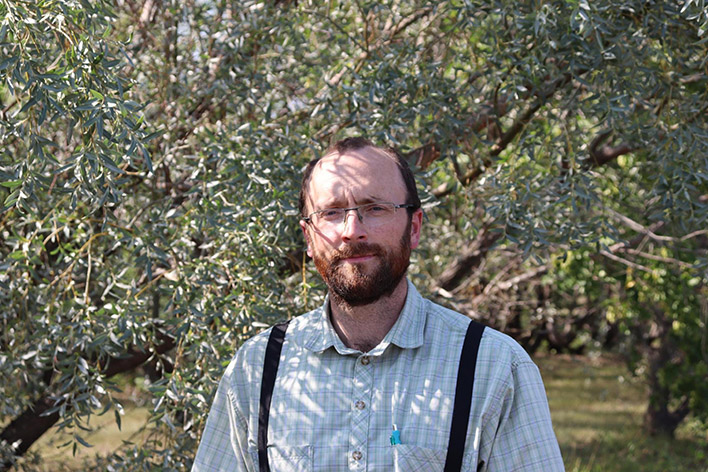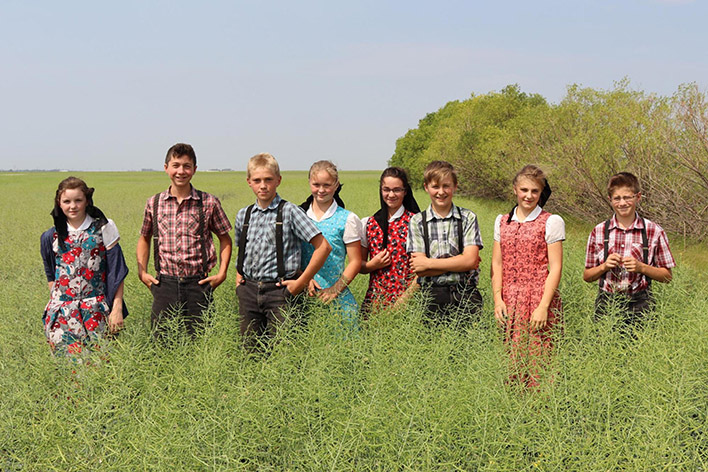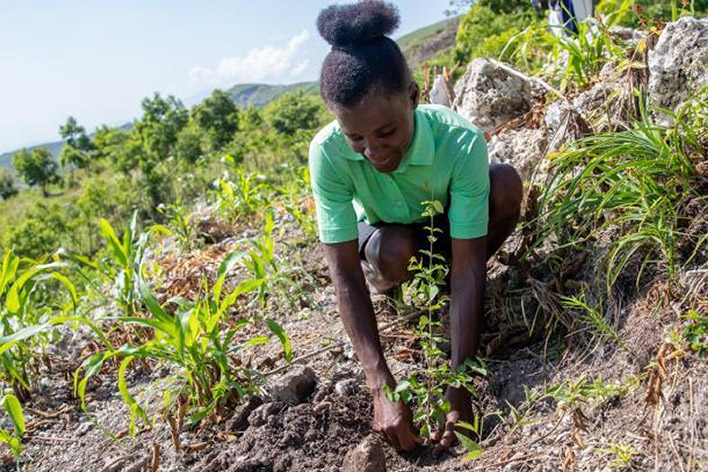This article was originally published by MCC Canada, a member organization of Canadian Foodgrains Bank.
At Silverwinds Hutterite Colony near Sperling, Man., philanthropy is an action verb. It’s apparent in generous acts of hospitality, community care, teaching methods and in a sunny canola field that’s growing hope at the entrance to the community.
Silverwinds Colony has partnered with MCC as a farmer for Grow Hope since 2018. A project that connects local farmers and donors, Grow Hope invites Manitobans to sponsor farmland, like Silverwinds’ canola field, with the crop proceeds supporting MCC food projects around the world.
And this spring, eight colony youth joined Silverwinds’ farmers to get hands-on with the project.
A teacher at Silverwinds School, Jesse Hofer, was looking for practical ways to engage his Grade 7 social studies class on topics of food security and philanthropy.

This spring, Silverwinds School teacher Jesse Hofer challenged his Grade 7 social studies class to a fundraising project in response to food insecurity. MCC photo/Emily-Ann Doerksen
“Anytime you get the students to go outside and check out a field, they get excited,” says Hofer. “When you get them to talk to people outside the walls of the school, that’s also engaging and exciting for them and a wonderful learning experience.”
So, Hofer connected with a handful of charitable organizations and arranged for guest presentations to the class. The students were then asked to evaluate their options and to select an organization and project to support.
MCC was among the presenting organizations, and, through virtual connection, Hofer’s class learned about MCC’s food security work from Zimbabwe to Haiti and Tanzania.
After evaluating their charitable options, the students landed on Grow Hope, a project born out of partnership between MCC, Canadian Foodgrains Bank and Manitoban farmers. Started in 2015, the initiative provides a local conduit to respond to food insecurity around the world.

A Silverwinds School fundraising class picture in the community’s Grow Hope field. From left to right: Krysta Hofer, Jacob Hofer, Robert Wollmann, Aliyah Hofer, Karina Waldner, Josef Waldner, Carrie Hofer and Ezra Wollmann. MCC photo/Emily-Ann Doerksen
A $300 sponsorship covers the costs of growing a crop on one acre of farmland. Silverwinds Colony, alongside a handful of farmers spanning southern, western and eastern Manitoba, works the land and donates the harvest proceeds to MCC’s account at the Foodgrains Bank. From there, the proceeds are matched by the Canadian government at a ratio of up to 4:1.
After selecting their fundraising project, Hofer’s class got to work quickly, raising funds to cover the cost of eight Grow Hope acres, one for each student in the class. They worked together to build pallets—wooden structures used for industrial storage, loading and transport—in the community’s workshop and collected the money from their pallet sales to make a donation to MCC just one month later.
It was a new undertaking for this Grade 7 class, who had never built pallets or run a fundraiser before. Thirteen-year-old Carrie Hofer says, “We wanted to do something hands-on.” Her classmate Aliyah Hofer adding, “It… felt like we were not just giving money, we were contributing.”

View of the Artibonite Valley where MCC partners with Konbit Peyizan to address food insecurity and the effects of climate change in Haiti. MCC photo/Christy Kauffman
Deep roots nurture growth
While Carrie and her classmates learned about food security and built pallets this spring, Aline Bernard cultivated her high mountain garden in Haiti’s Artibonite Valley.
Soil erosion and the effects of climate change threaten food security in Bernard’s community, which lies directly in the Atlantic hurricane path. In response, Bernard is implementing simple and affordable techniques that she learned through MCC supported agricultural trainings.
Konbit Peyizan, supported through MCC’s account at the Foodgrains Bank, taught Bernard’s agricultural collective to build horizontal terraces and to plant trees, grasses and plants with deep roots that will hold the soil in place. Growing trees together with plants provides nutritional diversity and helps to counter the effects of climate change. The shade also helps water better penetrate the soil as temperatures climb and rainfall becomes scarce and unpredictable.

Aline Bernard plants a tree to prevent soil erosion and help her mountainside garden better absorb moisture as weather patterns become less predictable in the Artibonite Valley of Haiti. MCC photo/Annalee Giesbrecht
Bernard says that today she is able to grow much more in her garden and has food throughout the dry season. She is empowered through local expertise and is more food secure because of generous gifts like the Grow Hope sponsorship offered by Hofer’s social studies class.
Hofer says he sensed his students’ energy and enthusiasm throughout the fundraiser.
“Working with their hands to help other people, that was meaningful to them… and they were proud of what they did.”
In the end, he says, teaching is really about planting a seed and watering it.
Written by Nikki Hamm Gwala.


